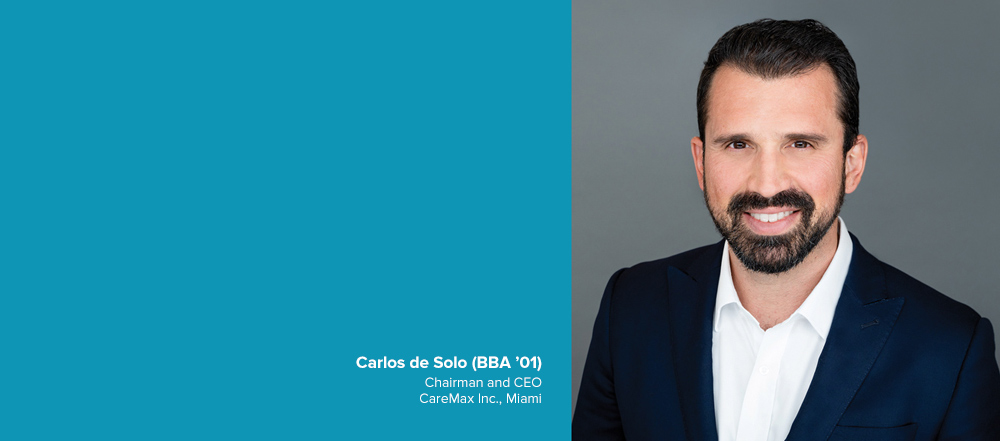
By Karen-Janine Cohen
Early in his career, Carlos de Solo (BBA '01), founder of stand-alone clinic chain CareMax Inc., worked as an equities trader. He then co-founded startup Solera Health Systems, which he later sold. De Solo found that the stress of working in finance impacted both mind and body. He turned to holistic health practices, which included meditation and a healthier diet.
Those insights, along with watching relatives struggle with healthcare issues, inspired the CareMax concept. Dealing with chronic illness can be nearly a full-time job, and de Solo wondered how those with a thin support system, especially seniors and low-income individuals, could coordinate care. CareMax provides continuity of care while focusing on a holistic approach to health and wellness.
By the end of 2022, CareMax expects to have 70 centers up and running, including 15 new locations in New York, Tennessee, Louisiana and Florida. De Solo, who founded the company in 2011, has leveraged his background in finance to craft a healthcare model that combines technology with focused patient care and outreach.
CareMax's stand-alone centers are mainly driven by Medicare Advantage plans. The company is paid a set sum for each patient, only making money by keeping patients healthy. Medicare Advantage plans generally have a narrower set of doctors from which to choose. These plans are typically cheaper than traditional Medicare and, in some cases, even give back money. In CareMax's case, all of their primary care doctors and specialists are in-house, creating a fully integrated care model.
To support CareMax's data-driven business model, De Solo also created CareOptimize, a proprietary tech platform that allows providers to access patient information from sources such as pharmacies and laboratories. The whole-person approach shone during the height of last year's COVID-19 surge, de Solo said, as CareMax clients experienced 50% fewer COVID-related illnesses and deaths compared to the equivalent general population. Additionally, they were able to reduce emergency room admissions by 74% when compared to the national average for Medicare members.
"We were able to prove our model," de Solo said.
In 2021, de Solo was named Ernst & Young Entrepreneur of the Year for Florida. The company also went public. "[It was] an interesting year," he said.
Plans for growth are ongoing. De Solo said data predicts that by 2028, more than half of Medicare-eligible seniors will be on Medicare Advantage versus traditional Medicare. "We are on the right side of this," he said. To facilitate the growth of its centers, CareMax has partnered with the Related Companies, giving the company the opportunity to open centers nationwide in affordable housing communities, built both by Related and other firms.
Going forward, de Solo, who sits on FIU's President's Council, hopes to soon become more involved with the university.
"We are in this hyper growth mode," he said, "but at some point," he added, "I would like to focus more on giving back."